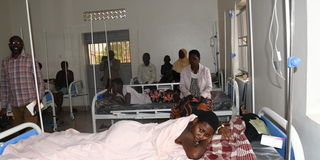Concern over malaria upsurge in Ntungamo

Patients at Rubare Health Centre IV in Ntungamo District on Saturday. The facility receives at least four malaria cases daily. PHOTO | FELIX AINEBYOONA
What you need to know:
- Ms Chemisto said the district has a population of about 500,000 people but in 2020, they recorded 40,500 cases of malaria, in 2021 there were 44,163 and in 2022, they confirmed 72,801 cases.
Authorities in Ntungamo District have expressed concern over the increasing cases of malaria.
In an Interview on Monday, the acting District Health Officer (DHO), Ms Beatrice Chemisto, said since 2020, malaria cases have been rising.
Ms Chemisto said the district has a population of about 500,000 people but in 2020, they recorded 40,500 cases of malaria, in 2021 there were 44,163 and in 2022, they confirmed 72,801 cases.
“We have registered a change in the disease trend as a district. Ntungamo has not been one of the prone malaria districts in Uganda,” she said.
“A few days ago we reviewed a report, which indicated that malaria is now more among the adults compared to the children. It is also increasing among pregnant women,” she added.
Most affected
Ms Chemisto said the most of the cases have been recorded in Rushenyi and Ruhama “although the general impression and the findings are across the district.”
The in-charge of Rubare Health Centre IV in Rushenyi County, Dr Osbert Taratwebirwe, said they receive at least four malaria cases on a daily basis.
“Most of our patients at the facility currently have a challenge of malaria but we do not have drugs because we expected NMS [National Medical Stores] to supply on December 19, 2022, but we are yet to receive the medicines,” he said.
Ms Chemisto said NMS is yet to deliver the district’s medical supplies for the third cycle.
“We are expected to receive six cycles, as we speak now, we have finished the first half of the financial year, so we should be having three cycles of supplies already with us but we have received two cycles and we are waiting for another cycle. So as this time lag for the other supplies is happening, we have cases of malaria becoming rampant,” she said.
Ms Chemisto said this worries them since the cases have also increased among the expectant mothers.
“The worst is the pregnancy outcomes, our data is also showing us that we are registering children of low birth weight, which could be having a relationship with malaria, and we are also registering mothers delivering before time, which we call prematurity,” she said.
Appeal
“If we have severe malaria that requires blood transfusion, the blood banks are not stocked enough. We usually see this for other conditions, so it becomes a worry for us,” she added.
When contacted, NMS spokesperson Sheila Nduhukire promised to consult about the matter and get back to us but had not done so by press time.
District chairperson Samuel Mucunguzi acknowledged the rising malaria cases.
“Actually now in Ntungamo, there is too much malaria if you go to most health facilities, most people there have malaria. we have lost about five people suffering from malaria and in most cases many of them are young; 14, 13,10, and 11 years,” he said.




